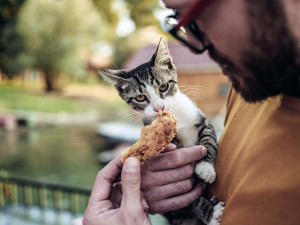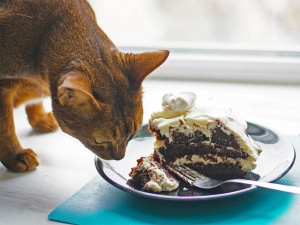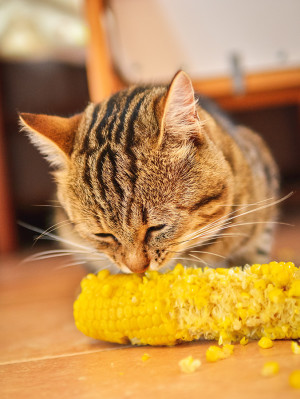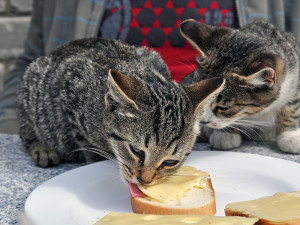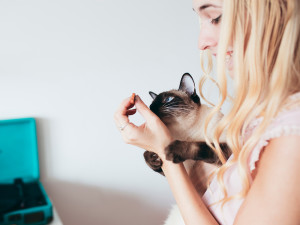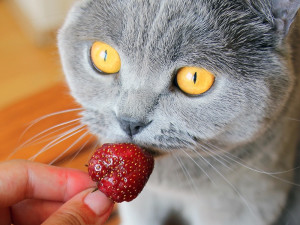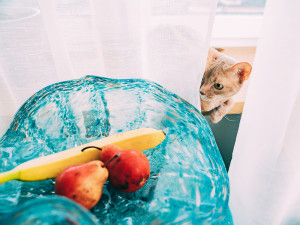What Human Foods Can Cats Eat?
We know they’re begging—but what’s safe to share?
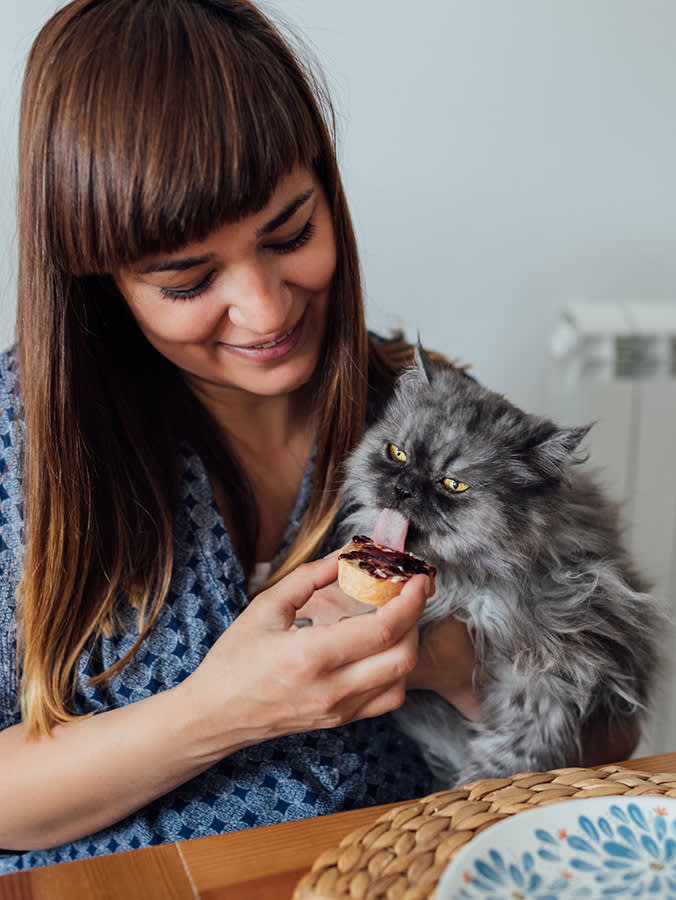
Share Article
If you think about it, it’s a funny construct of modern society that we have designated cat foods and human foods. At the most basic level, food provides energy, and many of the same foods that cats utilize for energy are also eaten by humans and other animals. What defines certain foods as cat foods nowadays is that they are typically commercially prepared diets that are complete and balanced, especially for cats. This ensures that cats are eating a diet with all of the vital elements needed to fuel those furry little torpedoes and achieve their best health and longevity.
And while I am not necessarily qualified to define what human food is, having seen some of the things people ingest at 2 a.m. on the subway, I can tell you that there is a very wide variety of foods humans eat and many of those may not be safe to share with our cats. Learn what foods are safe to share with your cat — and why they need a balanced diet.
Nutrition facts about cats
There is a common saying in veterinary medicine when it comes to cats’ health: “Cats are not just small dogs.” This is meant to highlight that cats are unique, with their own sets of needs, and they cannot simply be lumped together with dogs or other pets under generalized care guidelines.
When it comes to nutrition, this definitely rings true. The biggest nutritional difference between cats and dogs, or cats and humans, is that cats are obligate carnivores. This means that cats cannot meet their nutritional needs without eating meat. And while cats are carnivores, that does not mean they can survive on canned tuna or scraps of meat alone.
Cats who hunt are eating whole prey, so they are able to get additional nutrients from all parts of their prey including foods that may be in their prey’s digestive tract as well as the fur, feathers, bones, and/or organs of their prey.
It’s very tricky to replicate the balance of nutrients cats can get from eating whole prey, and this is why feeding your cat their regular cat food is so important. They have been tested and proven to provide all of the necessary nutrients for cats.
For cats who need a special diet, it’s best to work with your vet to find a commercially available option, or consult a veterinary nutritionist who can design a specialized plan for your cat while ensuring all of their needs are met.
Some of the unique nutrient requirements for cats include:
Protein: Cats have higher protein requirements than omnivores. For an adult cat, AAFCO guidelinesopens in new tab require a minimum amount of protein in any cat food to ensure it meets these needs, and many cat foods on the market exceed this minimum protein requirement. Some cats benefit from high-protein diets if they have certain health problems related to obesity and/or diabetes. The requirement also increases for cats who are pregnant, nursing, or still growing.
Arginine: This is an amino acid that is critical to normal biological functions, including the urea cycle. While humans and many animals can synthesize their own arginine, cats lack the enzyme to do so and must obtain arginine from their diet. Arginine is found in meat, poultry, fish, and dairy products.
Taurine: This is another essential amino acid for cats. It’s important for normal tissue function, especially in the retina of the eye and the heart. Cats cannot synthesize taurine unlike many other animals and humans, so their nutritional requirement for taurine is much higher. Cat foods are enriched to provide adequate amounts of taurine. Deficiencies often occur in cats who are fed unbalanced homemade diets, especially if they are vegetarian diets or all-meat diets.
Vitamin D: Those of us lucky enough to get a daily dose of sunshine can make our own vitamin D, but cats are not so lucky. They are unable to synthesize vitamin D and must obtain it from their diet. They utilize animal sources of vitamin D3 most efficiently. Vitamin D is important for bone health and deficiencies can cause problems like ricketsopens in new tab, or soft, deformed bones.
Vitamin A: By now you are probably catching on to the theme; many animals can synthesize vitamin A from beta-carotene in foods like carrots and sweet potatoes, but guess who can’t? Cats. Cats must get vitamin A directly from their diet. However, this is a fat-soluble vitamin which means too much of it can also accumulate in the body and cause toxic effects, so it’s critical to obtain the right balance.
Limited carbohydrates: As obligate carnivores, cats eat only very small amounts of carbohydrates when they are eating whole prey. They don’t have a requirement for carbohydrates, and while they can use them for energy, they don’t metabolize them as well as other animals. They can be at risk for obesity and diabetes when they overindulge on the regular.
Are human foods good for cats?
Given the complexity of feeding cats to meet their nutritional needs, it’s so important that cats get the bulk of their nutrients from a complete and balanced cat food. That said, everyone deserves a treat now and again, so what if you do want to share the occasional snack with your cat? This can be OK in moderation as long as you choose food that is safe and healthy for your cat.
It’s important to make sure all treats and table scraps are limited to less than 10 percent of your cat’s total diet to make sure they are saving room for the nutrients they really need from their cat food. Also, be sure to confirm that the foods you are offering are safe and non-toxic to cats. It may be surprising to learn that many common human foods are not safe for cats to eat. Some general categories of foods to consider sharing with your cat include:
Fruits and vegetables: These can provide crunchy, juicy, satisfying snacks loaded with vitamins, minerals, and fiber.
Lean meats: Small bite-sized pieces of plain, lean meats can be a chewy, delicious snack for cats. They also provide many important nutrients to these tiny carnivores.
Are human foods completely safe for cats?
Not all human foods are safe for cats, and it’s important to choose carefully when sharing food with your cat. Always offer these kinds of treats in very small amounts and prioritize feeding your cat a high quality cat food diet. Consider the following:
Toxins: Make sure any foods that you offer to your cat are non-toxic. If you are unsure if a food is safe for cats to eat, double-check with your vet and/or a pet poison hotline to confirm before sharing it.
Choking hazards and obstructions: Offer bite-sized, easy-to-chew portions to your cat. Be aware that some foods can be choking hazards if swallowed whole, such as very hard or round foods, foods with bones, or foods served with toothpicks or on skewers. Some of these items could also put cats at risk for intestinal blockages if they swallow a large piece that they can’t digest.
Oils and seasonings: Even if you know the main ingredient is safe for cats, check any other components of the dish to make sure they are safe as well. For example, foods cooked with garlic or onions should not be shared with cats because these are toxic. And foods prepared with a lot of butter, other fats, salt, or spicy ingredients like chilis may cause digestive upset and should be avoided.
High sugar or carb content: Cats are on the ultimate keto diet, and foods with a lot of sugar are no good for their bodies. The occasional lick of something sweet may be harmless, but try to avoid sharing sweets and carb-heavy snacks with your cat.
The bottom line: Can cats eat human food?
The real answer here is that it depends. There are many human foods that would be safe for cats to occasionally snack on; however, there are also a lot of nutrients they would miss out on if they only ate table scraps, meat, and/or human foods. And let’s not forget about all the human foods that are really not safe for cats, whether they are toxic or just unhealthy for them.
When it comes down to it, cats will be living their best life when their diet is complete and balanced, which means almost always eating their normal cat food. Sharing small treats of human foods can help strengthen your bond with your cat, provide enrichment in their lives, and offer additional health benefits. So, as long as they are shared in moderation and they are safe, they can have a place in your cat’s diet.
FAQs (People also ask):
How much human food can a cat eat?
Be sure the food is safe and non-toxic to cats and then limit all treats and table food to less than 10 percent of your cat’s total daily intake.
Is it OK to give cats human food?
It depends on the particular food. In general, cats need to eat cat food to meet their nutritional needs and human foods should be limited to the occasional treat.
Why do cats like human food?
Cats tastes are all different, but they may be attracted to the smell, texture, or novelty of a food they see you eating.
Is human food good for cats?
Some human foods can be good for cats in small amounts, but cats need to get the bulk of their diet from a complete and balanced cat food to avoid nutritional deficiencies.
Are human foods safe for cats?
Not all human foods are safe for cats and some can be toxic. Be sure to check that the food is non-toxic and safe for cats to eat before sharing with them.
Foods that are safe for cats
Watermelon can be a refreshing treat to share with your cat.
Peanut butter might suit your cat if you follow the suggested guidelines.
Ham is OK in small quantities, too.
Foods that are dangerous to cats
Garlic and onions can cause toxic anemia in cats.
Chocolate and these other nine foods should also be avoided.
Cheese can be a no-no for many cats, too.
References:

Dr. Amy Fox, DVM
Amy Fox, DVM is a small animal veterinarian in New York City. A lifelong animal lover, Dr. Fox studied biology in college and then worked as a veterinary nurse before pursuing veterinary school at Cornell University. She has worked in many different settings including shelter medicine, emergency medicine, general practice, and animal cruelty and forensics. She is especially interested in nutrition, preventative medicine and care for senior pets. Dr. Fox also enjoys writing about veterinary medicine and teaching. In her free time she loves to cook, garden, and go for long runs.
Related articles
![an orange and brown cat nibbles corn on the cob]()
Can Cats Eat Corn?
A few kernels won’t hurt, but think twice before doling out a bowl of the stuff.
![Two grey cats eating swiss cheese off of slices of bread while sitting on a table]()
You Should Not Invite Your Cat to Your Fancy Cheese Party
Save the charcuterie for the humans.
![Blonde woman holding cat trying to feed it ham]()
Can Cats Eat Ham?
Skip the green eggs, but ham is OK — with a couple caveats.
![Woman with tattoos eating noodles on the couch with her cat]()
Can Cats Eat Garlic?
It’s a human cooking staple, but your cat shouldn’t indulge.
![Grey cat eats a strawberry]()
Can Cats Eat Strawberries
Yes, strawberries are a nutritious treat for dogs.
![Cat behind a curtain attempting to get fruit in blue bowl]()
What Fruits and Veggies Can Your Cat Feast On?
Pass the fruit bowl — it’s treat time.

